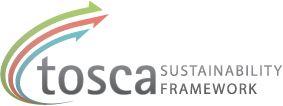Keyword: Tools (17)
AkzoNobel: Eco-efficiency
In this article the authors present how Eco-Efficiency Assessment (EEA) is used within AkzoNobel and applies that on chelating agents. The article was published in International journal of applied science, Personal care, detergents, and specialties. Issue number 10, 2009. Verlag für chemische Industrie Augsburg, Germany Eco-Efficiency Assessment in AkzoNobel
AkzoNobel: Eco-premium solutions
By Eco-premium solutions (EPS) is a quick scan method to qualitatively assess the performance of an AkzoNobel product compared to the performance of the competing mainstream products in a life cycle perspective, in terms of six HSE aspects (Health, Safety and Environment). The objective is to develop more sustainable products and to be able to […]
AkzoNobel: Environmental Impact Analyser
By Described here is an example from AkzoNobel of how environmental issues can become incorporated in the product development process. To be able to evaluate the impact on global warming, water usage and waste generation already in the R&D phase of a product, a tool for calculation of carbon, water and waste footprints has been developed for […]
Eco-efficiency Assessment (EEA)
By When comparing new products with competing products on the market, environmental as well as economical aspects are necessary in order to evaluate the market acceptance of the new products and the possibility to gain market shares. Also, in order to know where to put efforts and resources to acheive the most environmental gain, it is […]
Working with customers and consumers
By The customers and consumers have a central role in the work with sustainability in the value chains. They influence the work through their specific expectations regarding the sustainability of products and operations. Also, the customer or consumer can have a direct impact on the sustainability performance of the product depending on how they use […]
Some definitions of Eco-efficiency
By 1. ISO/DIS 14045 The ISO/DIS 14045 declares: “Eco-efficiency is a quantitative management tool that enables the consideration of life cycle environmental impacts of a product system alongside its product system value to a stakeholder”. The draft standard defines eco-efficiency as “an aspect of sustainability relating the environmental performance of a product system to its […]
Eco-efficiency
By In this Getting Started Guide we will introduce the concept of Eco-efficiency and the methodology of Eco-efficiency assessment and guide you to different uses of it. What is Eco-efficiency? Eco-efficiency is a management philosophy which encourages business to search for environmental improvements that yield parallel economic benefits. The objective is to become more efficient […]
How we work with LCA at AkzoNobel
By At AkzoNobel a corporate group, AN Sustainability, are specialists at performing environmental assessments with a life cycle thinking. The LCA methodology is used to perform a variety of different anlyses in order to support the strategic sustainability work of AkzoNobel. This is though not how it all started. The development of this group, AN Sustainability, are described below. […]
More information on Eco-efficiency
Here are some links to further reading about Eco-efficiency and assessment World Business Council for Sustainable Development (WBCSD). European Environment Agency (EEA)
Further reading: Stage-Gate® model
Many sustainability concerns, such as energy and resource efficiency as well as waste minimization, are also economic issues. Environmental considerations early in the product development process could offer more competitive and sustainable products to the market and avoid having to correct potential environmental problems after the product has been launched. Sustainability requirements and aspects should […]

